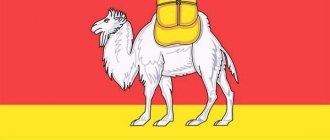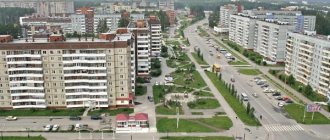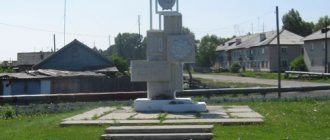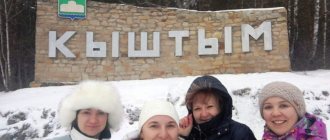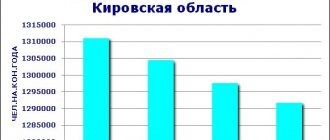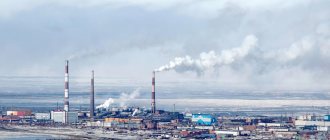Chelyabinsk region is one of the few regions of Russia where, next to settlements bearing Russian or Bashkir names, you can see regional centers and villages named after European capitals. Only the Southern Urals have their own Varna , Paris , Berlin and Leipzig .
So you can make a date under the arches of the Eiffel Tower , or walk through autumn Berlin , eat fried sausages on the outskirts of Leipzig and breathe the fresh air of Varna without a passport and without leaving the country’s borders.
Content
- 1 Millionaire cities 1.1 Chelyabinsk
- 2.1 Magnitogorsk
- 3.1 Zlatoust
- 4.1 Ozyorsk (Chelyabinsk region)
- 5.1 Bakal
How to get there?
It’s better to go not through Yuzhnouralsk , but through Varlamovo : the road is not so busy, sometimes completely empty, and the surface is better. But don’t forget the right shoes to knead the mud. ⠀ You need to leave Chelyabinsk along the Ufa Highway , in the Bishkil go left following the sign for Varlamovo . In general, there is a lot of interesting things along that road: from uranium mines to restored shops of gold miners.
Medium-sized cities 20-100 thousand people
Ozyorsk (Chelyabinsk region)
There are other settlements with this name, see Ozyorsk.
Population 79,518 people (2016).
Troitsk (Chelyabinsk region)
There are other settlements with this name, see Troitsk.
Population 75,825 people (2016).
Snezhinsk
Population 50,323 people (2016).
Satka
Population 42,437 people (2016).
Chebarkul
Population 40,612 people (2016).
Kyshtym
Population 37,809 people (2016).
Yuzhnouralsk
Population 37,716 people (2016).
Korkino
Population 35,186 people (2016).
Trekhgorny
Population 32,521 people (2016).
Asha
Population 30,146 people (2016).
Yemanzhelinsk
Population 29,487 people (2016).
Kartaly
Population 28,697 people (2016).
Verkhniy Ufaley
Population 28,267 people (2016).
Ust-Katav
Population 22,627 people (2016).
Sverdlovsk region
Forest
Lesnoy from the regional center by more than 250 kilometers to the north of the region, and tourists are separated from the most picturesque taiga forests and a high layer of concrete.
Photo source: GorodaRus
The idea to populate the taiga wilderness came to the government in 1947, along with the idea of building a scientific enterprise here for electromagnetic isotope separation. Gulag prisoners proceeded surprisingly quickly - by the beginning of 1950, a giant magnet weighing 3 thousand tons had already been installed, and by the end of the year the enterprise produced its first product - the uranium-235 isotope . In parallel with the enterprise, the village was rebuilt, which in 1954 was given the status of a city and named Sverdlovsk-45 .
Naturally, the activities of the enterprise, as well as its existence in principle, were unknown. The existence of a small town was revealed only 47 years after its founding.
Now, although the city has appeared on the map, it is still quite difficult to walk along its streets. get into Lesnoy , and the rest of the Ural ZATOs, with a pass, which is easiest to get if you have close relatives in the city or as part of a group.
Novouralsk
This city is located 80 kilometers from Yekaterinburg and is one of the first centers of the nuclear industry in the Urals .
Author of the photo: Andrey Kanatov
Although the city initially appeared for completely different reasons - in the early 1940s, the construction of a plant for melting light metal scrap began here. However, already in December 1945, production was curtailed, and in its place, Russia gaseous diffusion plant for uranium enrichment was erected.
Over the entire period of its existence, the city has taken on many names - “ Department No. 2 ”, “ Base No. 5 ”, “ Construction No. 865 ”, “ Plant No. 484 ”, Sverdlovsk-44 . The city also received its secret number name in 1954 along with city status. And since 1994, it was named Novouralsk , although people called it “ Atomic Switzerland ” - in honor of the incredible landscapes and main activities.
Svobodny village
The village acquired its rather ironic name in 1994 - before it was known (albeit to a limited circle of people) as Nizhny Tagil-39 .
Photo source: Nizhny Tagil-39 (Svobodny village)
Its history began relatively recently - in 1960, when the 42nd Missile Division, belonging to the strategic forces, was deployed to this area. Until October 2022, Svobodny had the status of a workers’ settlement; now it has been changed to an urban-type settlement.
Uralsky village
The village of Uralsky its history in the dense forest of the Beloyarsky district as the Pyany Bor tract . The tract existed until 1959, when military construction began here. A year later, the secret village of Kosulino-1 - a garrison of military unit 56653 , part of the USSR Strategic Missile Forces .
Under this name, the village existed for 35 years, after which it was declassified and given the official name - Uralsky village .
Small towns up to 20 thousand people
Bakal
Population 19,942 people (2016).
Kusa
Population 17,521 people (2016).
Plast (city)
Population 17,483 people (2016).
Kasli
Population 16,488 people (2016).
Katav-Ivanovsk
Population 16,333 people (2016).
Sim
Population 13,365 people (2016).
Yuryuzan
Population 11,908 people (2016).
Nyazepetrovsk
Population 11,901 people (2016).
Karabash
Population 11,336 people (2016).
Minyar
Population 9,459 people (2016).
Verkhneuralsk
Population 9,321 people (2016).
see also
- Chelyabinsk region
- Cities of Russia
| [ + ] Cities by regions of Russia | |
| Cities of the North-West (NWFD) | St. Petersburg (and its cities) • Leningrad region (historical Staraya Ladoga) • Arkhangelsk region • Vologda region • Kaliningrad region • Karelia • Komi • Murmansk region • Nenets Autonomous Okrug • Pskov region |
| Cities of the Volga region (Volga Federal District) | Bashkortostan • Volgograd region • Kalmykia • Kirov region • Mari El • Mordovia • Nizhny Novgorod region • Orenburg region • Penza region • Perm region • Samara region • Saratov region • Tatarstan • Udmurtia • Ulyanovsk region • Chuvashia |
| Cities of Southern Russia (SFD) | Sevastopol (including Inkerman) • Republic of Crimea • Adygea • Astrakhan region • Krasnodar region • Rostov region |
| Cities of the North Caucasus (NCFD) | Dagestan • Ingushetia • Kabardino-Balkaria • Karachay-Cherkessia • North Ossetia - Alania • Stavropol Territory • Chechen Republic |
| Cities of the Urals (Ural Federal District) | Kurgan region • Sverdlovsk region • Tyumen region • Khanty-Mansi Autonomous Okrug - Yugra • Chelyabinsk region • Yamalo-Nenets Autonomous Okrug |
| Cities of Siberia (Siberian Federal District) | Altai Republic • Altai Territory • Irkutsk Region • Kemerovo Region • Krasnoyarsk Region • Novgorod Region • Novosibirsk Region • Omsk Region • Tomsk Region • Tyva • Khakassia |
| Cities of the Far East (FEFD) | Amur Region • Buryatia • Jewish Autonomous Region • Trans-Baikal Territory • Kamchatka Territory • Magadan Region • Primorsky Territory • Sakha (Yakutia) • Sakhalin Region • Khabarovsk Territory • Chukotka Autonomous Region |
| see also | Cities of the DPR, LPR, Transnistria, South Ossetia • Regions of Russia • Cities of Russia |
Chelyabinsk region
Ozersk
Ozersk in Russia to visit . It is here that the first industrial facility of the domestic nuclear industry is located, which has been producing components for nuclear weapons for 75 years. In addition to industry lovers, the city also attracts dark tourists who are not averse to touching the area where one of the most famous man-made disasters occurred.
The city appeared in 1945 on the shores of Lake Irtyash , under the secret name Baza-10 . Mayak chemical plant , consisting of three secret facilities - a reactor, a plant for processing uranium into plutonium, and a plant for purifying plutonium and creating nuclear weapons. In 1954, the settlement was renamed Chelyabinsk-40 and received city status.
Over the history of its existence, Mayak has survived more than one emergency situation: for example, in 1953, employees were overexposed, and in 1955, as a result of an accident, part of the building collapsed, but the largest emergency occurred in September 1957. As a result of the incident, which later became known as the Kyshtym accident , about 20 million curies of radioactive substances were released into the air, spreading throughout the Chelyabinsk , Sverdlovsk and Tyumen regions. Interestingly, Chelyabinsk-40 was not damaged.
9 years after the accident, the city received a new name - Chelyabinsk-65 , which it bore until declassification in 1994. Due to the large accumulation of lakes in this area, the city was given the official name - Ozersk .
Snezhinsk
Snezhinsk is considered one of the most famous cities in Russia , and not only closed ones. After all, it was here that “ Kuzka’s Mother ” was developed - the most powerful weapon in the entire history of mankind.
Author of the photo: Igor Karionov
The city was founded in 1955 under the name Residential Village No. 2 . Since then, it has changed many names - Kasli-2 , Chelyabinsk-50 , Chelyabinsk-70 - until in 1994 it was called Snezhinsky . During this time, more than half of the nuclear warheads in service with the Russian Army . Now one of the largest enterprises in the nuclear industry is located here: the Russian Federal Nuclear Center - All-Russian Scientific Research Institute of Technical Physics named after Academician E. I. Zababakhin .
The desire to visit this city is caused not only by a touch of mystery, but also by incredibly beautiful nature - it is considered the most beautiful of all the cities under the auspices of Rosatom . It is surrounded by dense forests and thirteen lakes, including Itkul , Sinara , Sungul and others.
Trekhgorny
In 1952, among tall pines and wide firs, an enterprise was founded that was to produce atomic bombs. A workers' settlement was built next to the production, which three years later became a city. Previously, the city was called Zlatoust-36 , and before that - Zlatoust-20 . In October 1993, the secret city was reclassified as closed and received the name Trekhgorny .
The modern city-forming enterprise is an instrument-making plant, where a number of different goods are produced - from the most complex special equipment products to metal structures for churches .
